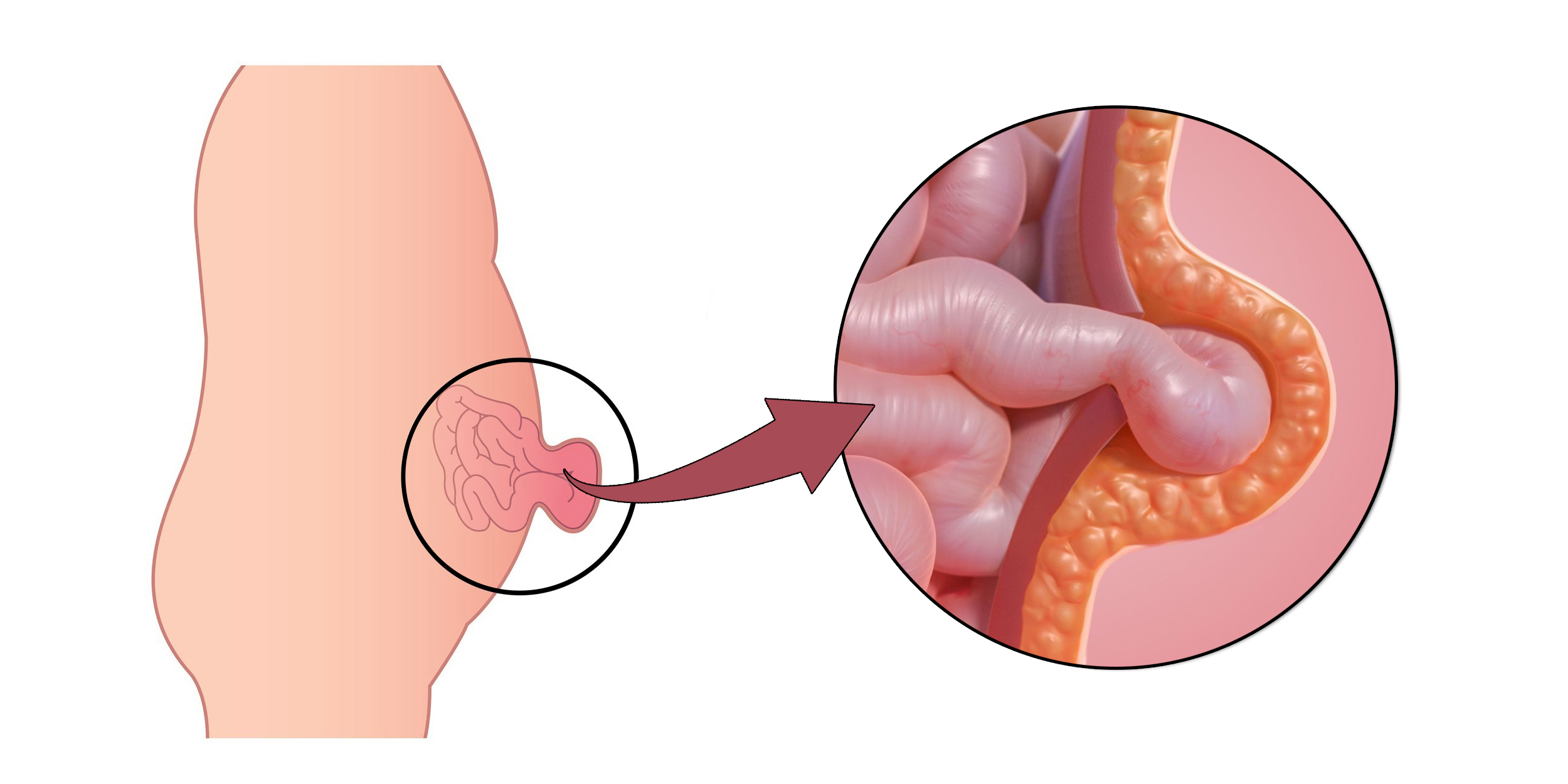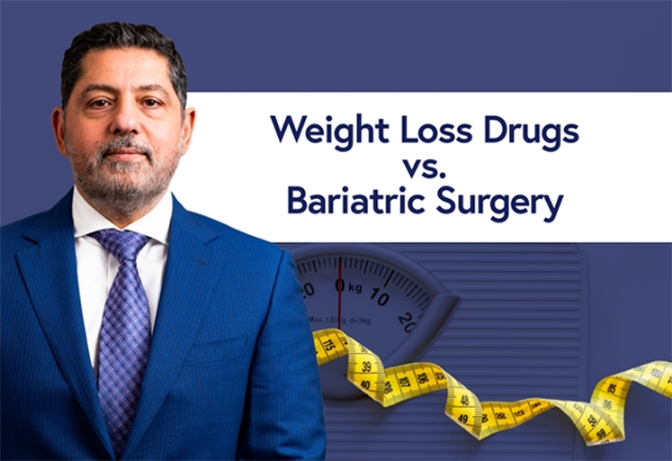Weight Loss Drugs vs. Bariatric Surgery – Which is Right For You?
If you’re trying to lose weight and finding it difficult, you may have considered taking medications or undergoing bariatric surgery. Both of these... read more
Call Us Today (732) 640-5316
E-Waiting RoomAn umbilical hernia is a common type of hernia in adults, often requiring surgical repair. The team of hernia specialists at Advanced Surgical & Bariatrics of NJ, PA consists of ABS-board certified and fellowship-trained surgeons who specialize in umbilical hernia surgery and other types of hernia repairs using the latest techniques on the planet. The Hernia Center of NJ at Advanced Surgical & Bariatrics is a certified Center of Excellence in Hernia Repair by the SRC. Visit one of our office locations to see what repair approach is best for you, and how you can achieve surgical recovery with less pain, less downtime, and faster return to normal activity.
An umbilical hernia is a protrusion or bulge that can be seen or felt at the belly button. This condition develops when a hernia defect or hole develops in the deep layers of the belly button itself, allowing abdominal structures or a portion of the intestine to protrude through the abdominal wall.
Umbilical hernias in children are caused by an opening in the abdominal wall that is present at birth. The bulge can be seen and felt all the time or only when the child is crying, coughing, or straining during bowel movements. This protrusion may disappear when the child is relaxed.
One in every six children has an umbilical hernia, affecting both boys and girls equally. This condition is more common among African-American children, low birth weight, and premature infants and will often go away naturally by age 4. Unlike children, however, umbilical hernias in adults should be repaired if they are causing symptoms of pain or bulge.

The most common symptoms associated with an umbilical hernia are pain and a bulge. Usually, symptoms are stable over time, but the bulge can often become larger or involve the entrapment of internal organs such as the intestine. Anyone with a known umbilical hernia who develops persistent nausea and vomiting with severe abdominal pain and inability to pass gas or stool may have intestinal entrapment (incarceration or strangulation), resulting in is a potentially life-threatening situation. This is a medical emergency that requires immediate evaluation; proceed to your nearest emergency room without delay.
The abdominal organs are formed outside of a baby’s body during their development in the womb. These organs return to the abdominal cavity around the 10th week of gestation. If the wall of the abdomen fails to close around the abdominal organs, an umbilical hernia can form.
On occasion, the intestines can become trapped in this muscular defect, which causes umbilical pain and tenderness. This condition is called an incarcerated hernia and must be evaluated immediately to prevent the cause of damage to the intestines. Symptoms of an incarcerated hernia include severe pain and redness of the bulge.
In children, most umbilical hernias will go away on their own by age 3 or 4. Thus it may be recommended to wait until your child has reached this age to consider surgical repair. However, if the defect is greater than 2cm in diameter, it will need to be surgically repaired. In adults, any symptomatic umbilical hernia should be evaluated for repair.
For children, a small incision will be made at the base of the belly button where the bulge can be identified. Then the hernia contents are pushed back into place, and the hernia defect is closed. Multiple sutures are put in place to prevent another hernia from forming again. The skin around the belly button will be sewn down and attached to the underlying muscle so that the belly button looks like an “innie” instead of an “outie.” Most children can return home within a few hours after surgery. However, children with certain medical conditions and premature infants may need to remain under observation for one night.
For adults, the decision to repair an umbilical hernia with or without mesh depends on the size of the hernia defect found at the time of surgery. The surgeons at Advanced Surgical and Bariatrics of NJ can evaluate you and provide more details at your consultation visit.
Advanced surgical is great. They did my surgery although another surgeon wouldn't as she said my hernia was too big. I am 10 months out and lost 56 lbs. I feel great and I'm off my medications. I have 30lbs to my goal weight but I will get there. The staff is terrific. I couldn't ask for anything better.
Sharon J.Surgery for umbilical hernia is a simple treatment that involves a relatively small number of risks. Our surgeons are tremendously experienced in performing complex procedures and can detect all the possible risks in advance. We take all required precautionary steps to prevent any issues and will inform you of all potential complications prior to your treatment. Though complications from an umbilical hernia repair are rare, they may include:
Before your procedure, let your surgeon know what medications you take. You should avoid taking aspirin and nonsteroidal anti-inflammatory medicines (Motrin, ibuprofen, Aleve) a few days before your treatment. Blood thinners and vitamin supplements should also be excluded. Inform our anesthesiology specialist about your medical history and specifically, mention if you have any allergies or bleeding disorders. If you vape, use cigars, chew tobacco, or smoke cigarettes, our specialists may recommend you to stop all nicotine-containing products prior to hernia surgery. You may be restricted from consuming any solid foods past midnight the night before surgery, then restricted to clear liquids only, then nothing by mouth at all for a number of hours before surgery. On the day of your surgery, wear comfortable loose-fitting clothing and shoes that can slip on and off.
During the procedure, your surgeon will push the intestine protruding through your navel back into your stomach. There are two general methods of doing this: the open approach and the laparoscopic (keyhole) approach. Our specialist will determine which suits you better depending on your weight and prior surgery history. The open approach involves a small incision near your belly button.
The contents of the bulge are revealed and repaired using sutures and/or hernia mesh to support the weakened tissue. An open umbilical hernia repair is typically done with an incision above or below the belly button itself. The laparoscopic/robotic approach requires a few small keyhole incisions in your abdominal wall for a tube-like telescopic camera and thin surgical instruments. The incision sites will be closed with sutures, surgical glue, and steri-strips.
Your full recovery will take up to 8 weeks, but normal activity can be resumed right away, and most people go back to work in 2-3 days. The majority of patients go home from the hospital the same day. The effects of the general anesthesia typically subside in 24-48 hours. Your surgeon will indicate your specific activity restrictions on your discharge paperwork.
You may experience mild abdominal discomfort for several weeks after hernia surgery. You will be given an abdominal binder to wear home from the recovery room. It is recommended that you wear this at all times for the 8 week recovery period. Over the counter pain relievers (ibuprofen, naproxen, acetaminophen) may be taken. Your surgeon will write out how to use these medications in your discharge paperwork. Always contact your surgeon if the pain worsens or doesn’t subside. Certain self-care guidelines should be followed for a full and successful recovery including:
The professional team of hernia surgeons, led by Drs. Sadek and Melman strive to deliver expert care in a compassionate, respectful way and has decades of experience and expertise to treat your hernia. Visit one of our office locations and discover why so many patients consider us the best Hernia surgeons in New Jersey.

Dr. Ragui Sadek is a premier surgeon who established a state-of-the-art and one of the safest bariatric surgery programs in the state. Dr. Sadek has fellowship training in both laparoscopic/bariatric surgery and surgical trauma/critical care, allowing him to safely perform complex surgeries on patients who have been turned down by other practices. As a Clinical Assistant Professor of surgery at RWJ Medical School & the Director of bariatric surgery program at RWJ University Hospital, Dr. Sadek offers a cutting-edge range of laparoscopic, robotic, & bariatric surgical procedures with a complication rate substantially below the national average.
Dr. Sadek is a Clinical Assistant Professor of Surgery at Rutgers-Robert Wood Johnson Medical School and a Fellow of the American College of Surgeons. Having performed more than three thousand advanced surgical procedures, Dr. Sadek has established a strong patient satisfaction rate and a solid reputation among the surgical community and is renowned as a top physician in his field by International Association of Healthcare Professionals. As a board-certified surgeon, he holds affiliations with the American Society of Metabolic and Bariatric Surgery and the Society of American Gastro Endoscopic Surgeons. More about Dr. Sadek
Stay current with Advanced Surgical & Bariatrics of New Jersey

If you’re trying to lose weight and finding it difficult, you may have considered taking medications or undergoing bariatric surgery. Both of these... read more

Are you frustrated with your inability to lose weight? Tired of being trapped in an endless cycle of yo-yo dieting, over-exercising, cleanses, and... read more